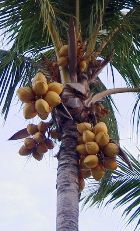
Plant Part: Kernel
Extraction: Cold Pressed
Growing Practice: Ethical
A refined Coconut oil that is light and non-greasy, and liquid at room temperature. Readily absorbed into the skin, it is a superior carrier for essential oils, hastening their ability to get into the skin and to the problem areas. It glides on easily does not stain sheets or clothing which makes it a good massage oil.
It should be noted, however, that this is not a complete oil (see Plant Tab) and may not be considered by some as suitable for aromatherapy.
Refractive Index: 1.448-1.451 1.449 @ 20°C
Specific Gravity: 0.93-0.96 0.95 @ 20°C
Appearance: clear liquid
BioChemicals: Fatty Acid Content:
Saturated Fatty Acids C6 Caproic acid (0.5% max), C8 Caprylic acid (53% min), C10 Capric acid (36-47%), C12 Lauric acid (1.5% max)
Saponification Value: 325-345
CAS No: 65381-09-1
Coconut palms need abundant sunlight, regular rainfall, and high humidity for optimum growth, which is why they aren't often seen in the Mediterranean.
The Philippines is the largest producer of coconuts with 17 million tonnes, followed by Indonesia and India in distant third. Each palm can produce at least 75 fruits per year when fully grown (30 years).
Fractionated Coconut Oil
Fractionated coconut oil differs from regular coconut oil in that it has had some of the long chain fatty acids removed, changing the physical and chemical characteristics of the oil. It is sometimes called MCT (Medium chain triglycerides) coconut oil.
The fractionating process is accomplished by liquefying the oil, adding a small amount of another oil to stimulate crystallization, and then slowly cooling the oil while physically agitating it. This separates the longer chain fatty acids which crystallize first and are then removed.
Fractionated coconut oil has a very low melting point, never goes rancid and has a long shelf life, is readily absorbed into the skin, washes out of massage table sheets easily, and has a low viscosity.
Cosmetics and Skin Treatments
- Essences
- massage oils
- creams
- lotions
- bath oils
- soaps
- moisturizes dry hair
- claimed to support tanning (without sunscreen)
Natural Perfumery
- Ideal as an alternative to alcohol as a carrier.
- Sprays through a pump or Spritzer with ease
The process for fractionating coconut oils was discovered when coconut oil was transported in gently rocking ships for long distances; it arrived separated into two parts. The process is similar to churning butter. The process probably was first applied in 1872 when margarine was first produced by Mège Mouriès.
Although this process has been referred to as distillation, it is not the same thing, and since it is done at low temperatures it does not harm the oil. In fact, it was originally called "winterization" because it was done during the winter.![]()
Fractionated Coconut Oil is generally considered to be of low hazard when used externally. It may cause an allergic reaction in some. If irritation occurs, discontinue use.
Excellent extended shelf life and will not oxidize.
The information provided on these pages is not a substitute for necessary medical care, nor intended as medical advice. Always keep carriers and bases tightly closed and in a cool, dark place, out of reach of children. If redness or irritation occurs when applied to the skin, stop using immediately and contact your health provider if necessary.![]()
all images and content copyright ©2000—2020 by suzumebachi design and samara botane





